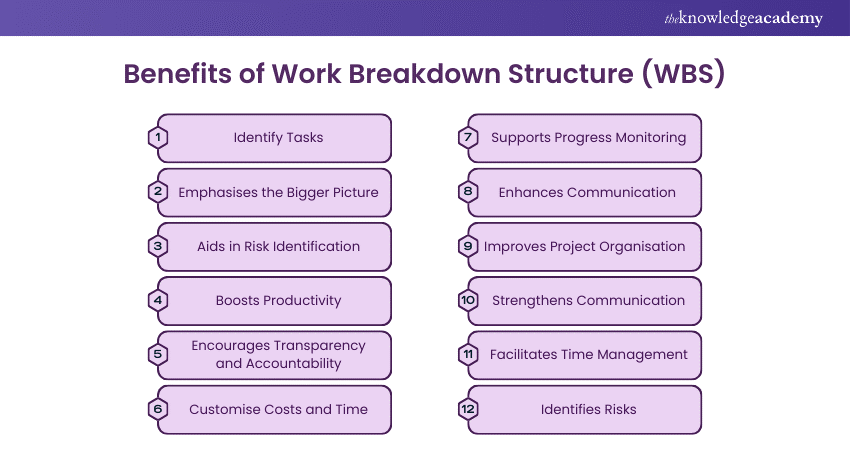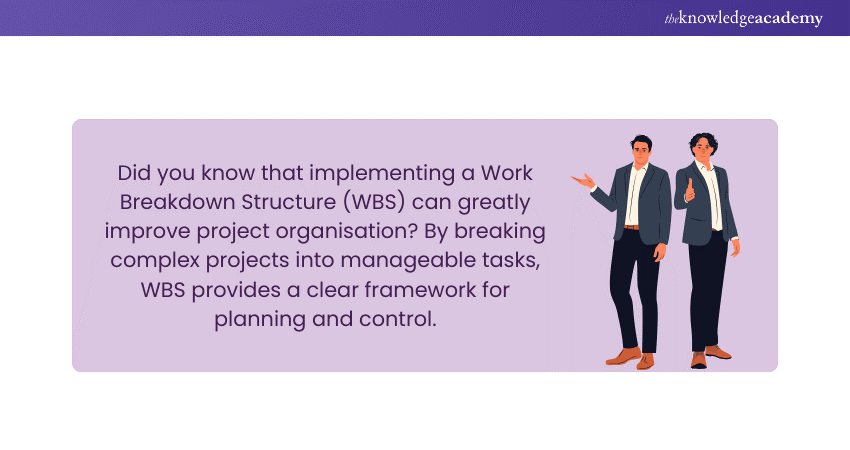We may not have the course you’re looking for. If you enquire or give us a call on +44 1344 203 999 and speak to our training experts, we may still be able to help with your training requirements.
Training Outcomes Within Your Budget!
We ensure quality, budget-alignment, and timely delivery by our expert instructors.

The Benefits of Work Breakdown Structure (WBS) extend beyond mere task management; they offer a holistic view of the project, enabling better communication, accountability, and productivity. With WBS, each team member can see how their contributions belong in the bigger picture, fostering collaboration and reducing the risk of oversight. This organised breakdown transforms chaos into clarity, helping project managers to anticipate challenges and ensure smoother workflows.
Exploring the top Benefits of Work Breakdown Structure, this blog will highlight how WBS optimises project planning, boosts productivity, and simplifies tracking. Whether you're leading a simple initiative or a multi-phase project, understanding and utilising the power of WBS can make a tangible difference in achieving your project goals.
Table of Contents
1) Benefits of Work Breakdown Structure
a) Identify Tasks
b) Emphasises the Bigger Picture
c) Aids in Risk Identification
d) Boosts Productivity
e) Encourages Transparency and Accountability
f) Customise Costs and Time
g) Supports Progress Monitoring
h) Enhances Communication
i) Improves Project Organisation
j) Strengthens Communication
2) Conclusion
Benefits of Work Breakdown Structure
WBS is more than just a chart or a diagram; it’s a systematic approach to breaking down work, managing tasks, and achieving project goals. Here’s how it can benefit your project in tangible ways.

1) Identify Tasks
One of the primary benefits of WBS is that it helps teams identify all tasks required to complete a project. By dividing the project into smaller components, WBS ensures that no task is overlooked. Each team member analyses what needs to be done, and when, which leads to a clear division of work.
WBS allows teams to plan their activities in a way that prevents overlap and minimises confusion. This clarity of task identification is particularly beneficial in complex projects with many moving parts, as it provides a structured approach to each segment, reducing the risk of delays.
2) Emphasises the Bigger Picture
WBS not only brings clarity to individual tasks but also ensures that everyone on the team can see the bigger picture. Each task or component in the WBS is tied to a larger goal, allowing team members to learn how their specific roles fit into the overall project vision.
This broader view is essential in ensuring that no one loses sight of the project’s ultimate purpose and objectives. When every team member understands how their contributions align with the project's goals, motivation and morale are often improved, leading to a more cohesive and focused team effort.
3) Aids in Risk Identification
In any project, risk identification is crucial for anticipating potential challenges before they become issues. WBS provides a comprehensive view of the project, allowing for easier identification of risks associated with specific tasks or stages.
When each element is laid out in a structured format, project managers and team members can anticipate potential delays, bottlenecks, or resource needs, enabling them to put preventive measures in place. This proactive approach reduces the chances of surprises along the way and creates a more resilient project plan.
4) Boosts Productivity
By breaking down the workload, WBS boosts productivity among team members. When each task is clearly defined, and individuals know exactly what they need to accomplish, productivity soars. There is less time wasted in confusion or waiting for directions, and more time spent on actual work.
Having a clear WBS also means teams can easily prioritise tasks, tackling high-impact activities first. This structured approach to task completion minimises distractions and ensures everyone is working efficiently, leading to faster and more effective project execution.
5) Encourages Transparency and Accountability
A well-defined WBS inherently fosters clarity and accountability within the project team. If each task were explicitly assigned, then everyone would know what is expected of them and, therefore, what to look for in others' contributions.
Transparency of the owner to the task also creates an accountability culture. Team members are motivated enough to deliver their best work because they know that they own up to such work, which will directly impact the project. In this context, it also allows the project manager to track individual contributions so that he/she can give recognition where appropriate or support the need where needed.
6) Customise Costs and Time
WBS enables the project manager to vary the cost and timelines according to the specific needs of the respective tasks. This break-up of a project into logical components allows better estimation of time and resources at the management level, which prevents overspending and time overruns.
This approach ensures that resources are fairly distributed to where they best need them. Costs and timelines are customised task by task, ensuring project expenditures and scheduling are controlled by managers in order not to compromise on either budget or quality and deadlines.
Ready to elevate your project management skills? Join the Project Planning and Control™ (PPC) Foundation Course and gain tools for effective control. Start now!
7) Supports Progress Monitoring
WBS is an excellent tool for progress monitoring, as it provides a clear framework for tracking the completion of each task. With each component of the project clearly defined, project managers can assess how much progress has been made at any given time and identify areas that may need extra attention.
By regularly checking off completed tasks, teams can visually see their progress, which can be highly motivating. This progress tracking also enables project managers to provide updates to stakeholders, demonstrating the project’s advancement in a transparent and reliable manner.
8) Enhances Communication
Communication is paramount to successful project management, and WBS plays a significant role in enhancing communication across the team. By providing a clear overview of tasks and responsibilities, WBS reduces misunderstandings and ensures that everyone is on the same page.
Since each team member knows their role within the WBS, it becomes easier to communicate specific needs, issues, or updates. This structured approach promotes an environment of open dialogue and collaboration, allowing for more effective and constructive communication within the team.
9) Improves Project Organisation

With WBS, project managers can organise complex projects in a structured and logical manner. By allocating the project into smaller, manageable parts, WBS transforms what might seem like an overwhelming workload into a sequence of achievable tasks.
This organised structure simplifies project management and allows team members to concentrate on their specific tasks without feeling lost in the broader scheme of the project. It also assists project managers to allocate resources and prioritise tasks efficiently, improving overall project organisation.
10) Strengthens Communication
Beyond team communication, WBS also strengthens communication with stakeholders. By presenting the project in a simplified, organised manner, WBS makes it easier to communicate the project’s scope, objectives, and timelines to stakeholders.
Stakeholders can better understand the project’s progress, how resources are being used, and any potential delays or changes. This transparency fosters trust and keeps stakeholders informed, ultimately contributing to a smoother project approval and feedback process.
11) Facilitates Time Management
Time management is critical in any project, and WBS facilitates this by providing a clear timeline for each task. With a defined structure, project managers can assign realistic deadlines, ensuring that each stage is completed on schedule.
Breaking down the project into smaller tasks also enables better time estimation, helping teams avoid time overruns and stay on track. This precise approach to time management is essential for meeting project deadlines and delivering results within the expected timeframe.
12) Identifies Risks
Finally, one of the most valuable benefits of WBS is its ability to identify potential risks early in the project. By dissecting the project into its individual components, WBS allows project managers to foresee challenges specific to each task and take proactive steps to address them.
This early risk identification and mitigation strategy is key to having the project on track and avoiding unnecessary disruptions. Anticipating risks before they materialise not only saves time and resources but also builds resilience into the project plan.
Ready to boost your project skills? Join our Project Planning and Control™ (PPC) Practitioner Course and plan with precision. Register now!
Conclusion
The Work Breakdown Structure (WBS) is a transformative tool in project management, offering a structured approach to dividing complex projects into manageable tasks. By helping teams identify tasks, see the bigger picture, and improve productivity, WBS empowers projects to run smoothly from start to finish. With its benefits extending to risk identification, enhanced communication, and better organisation, WBS is an invaluable asset for any project manager.
Unlock expert project planning skills with our Project Planning and Control™ (PPC) Foundation and Practitioner Course. Join now to steer your projects to success!
Frequently Asked Questions

The five levels of Work Breakdown Structure (WBS) are project, deliverable, sub-deliverable, work package, and activity, each defining increasing detail. Guidelines include clear definitions, manageable parts, scope adherence, clear ownership, and using the 8-80 rule.

The 8-80 rule simply states that all WBS tasks would take ideally not less than 8 hours and not more than 80 hours to complete. Thus, with the 8-80 rule, you can ensure that every task will be possible to track but too big to be tracked through minute details.

The Knowledge Academy takes global learning to new heights, offering over 30,000 online courses across 490+ locations in 220 countries. This expansive reach ensures accessibility and convenience for learners worldwide.
Alongside our diverse Online Course Catalogue, encompassing 19 major categories, we go the extra mile by providing a plethora of free educational Online Resources like News updates, Blogs, videos, webinars, and interview questions. Tailoring learning experiences further, professionals can maximise value with customisable Course Bundles of TKA.

The Knowledge Academy’s Knowledge Pass, a prepaid voucher, adds another layer of flexibility, allowing course bookings over a 12-month period. Join us on a journey where education knows no bounds.

The Knowledge Academy offers various Project Planning and Control Courses, including the Project Planning and Control™ (PPC) Foundation and Practitioner Course, and the Project Planning and Control™ (PPC) Foundation Course. These courses cater to different skill levels, providing comprehensive insights into What is Project Planning.
Our Project Management Blogs cover a range of topics related to Project Planning and Control, offering valuable resources, best practices, and industry insights. Whether you are a beginner or looking to advance your Project Management skills, The Knowledge Academy's diverse courses and informative blogs have got you covered.
Upcoming Project Management Resources Batches & Dates
Date
 Project Planning and Control™ (PPC) Foundation
Project Planning and Control™ (PPC) Foundation
Mon 24th Feb 2025
Mon 30th Jun 2025
Mon 15th Sep 2025
Mon 15th Dec 2025







 Top Rated Course
Top Rated Course



 If you wish to make any changes to your course, please
If you wish to make any changes to your course, please


